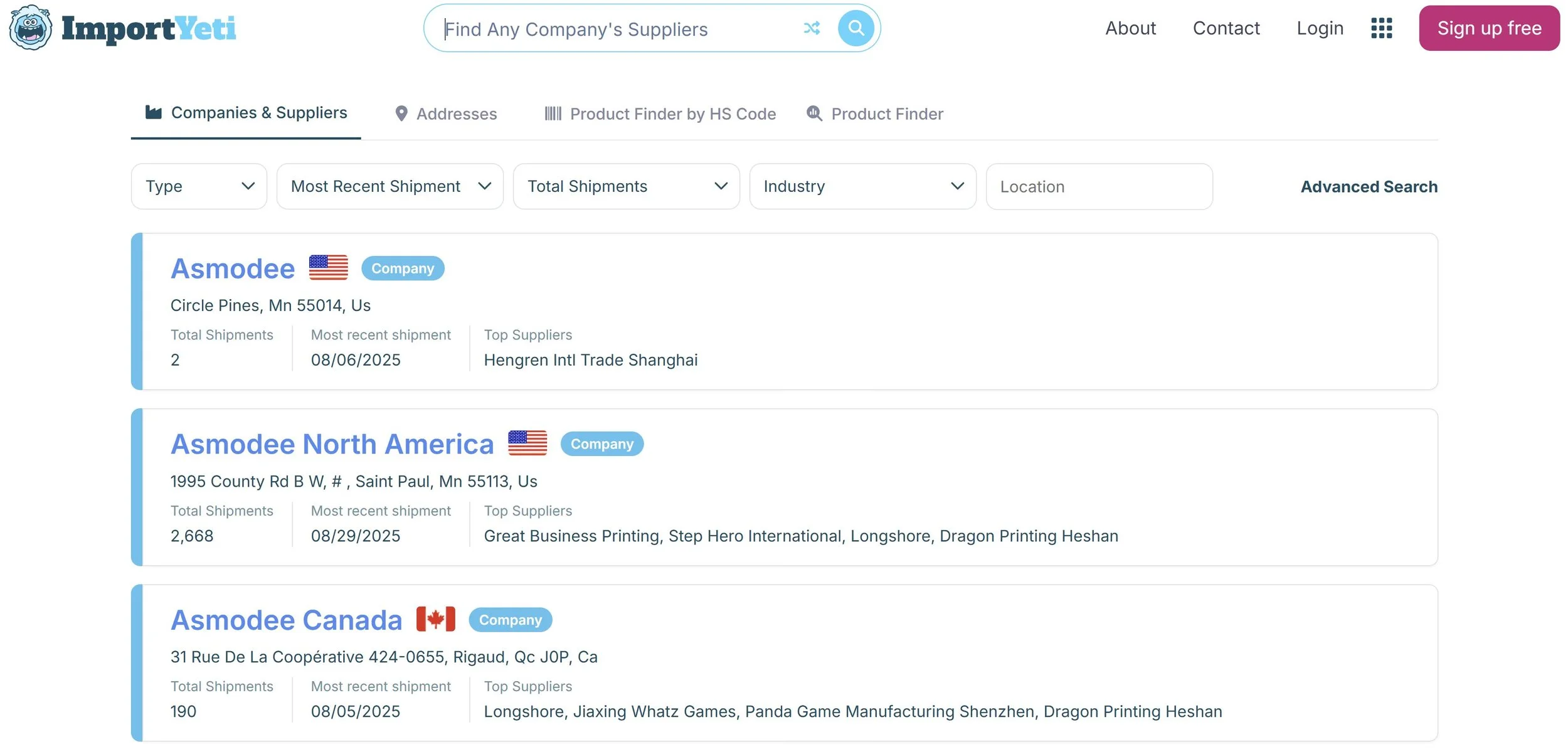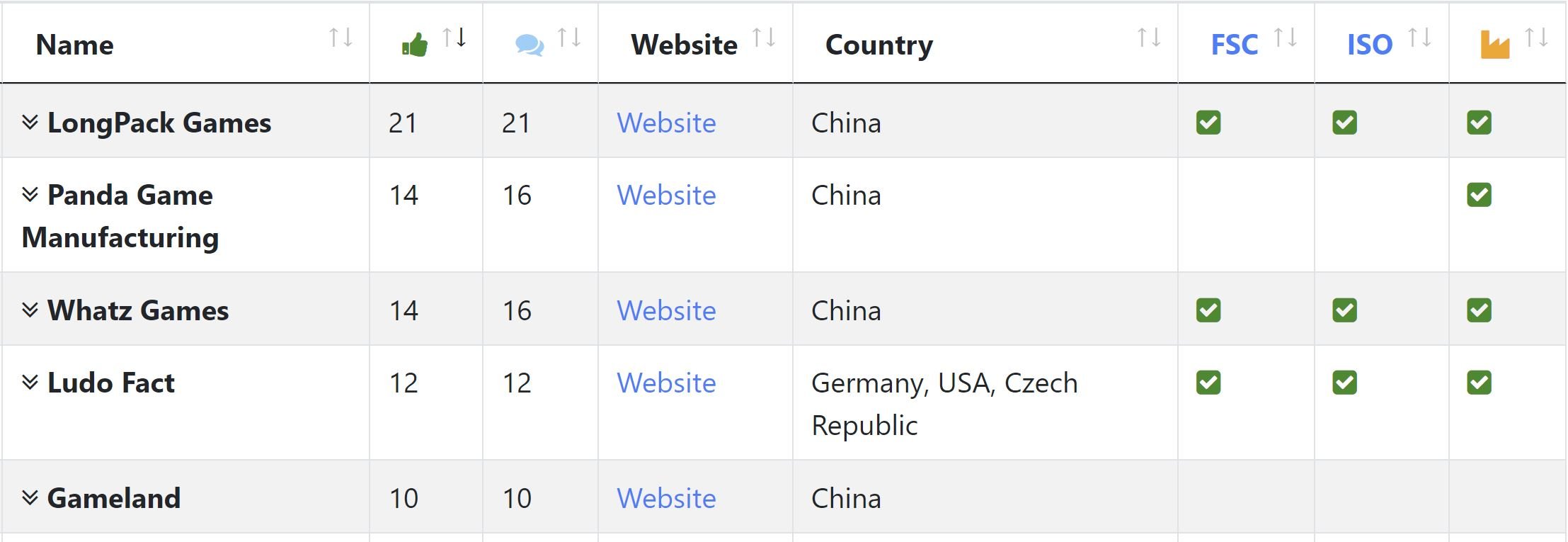Finding a Manufacturer for your Product
As a consumer products entrepreneur, I get a lot of nuts-and-bolts questions about building a business: sourcing, sales, and all the practical steps behind launching a consumer brand. I normally write specifically about board game publishing, but I wanted to share some broader advice over the next series of posts.
For this first installment, let’s focus on one of the most critical decisions you’ll face: how to find and choose the right manufacturer for your product.
Key Considerations
The right manufacturing partner can make or break your business. A print/manufacture run will be one of your largest early capital outlays, so it’s important to find the perfect match. At a high level there are a few key considerations you should keep in mind:
Capability – Can they produce your product at the quality you need?
Communication – Do they respond promptly and clearly?
Price – Is the quote competitive and transparent?
Reputation – Do they have a solid track record with other customers?
Ethics – Do they operate responsibly and align with your values?
Capability - Finding a Manufacturer
In board games, the vast majority of production happens in China, with smaller hubs in Southeast Asia, Eastern Europe, and Brazil. Many consumer goods categories follow similar global patterns, though some industries cluster more heavily in specific geographies.
Finding a reputable overseas manufacturer is easier than it sounds. Once you’re in the market, factory reps will find you at conventions – or flood your inbox. But when you’re just starting out, you’ll need to find manufacture partners on your own.
My favorite method is to use a tool like ImportYeti – which compiles U.S. customs data into a searchable database. By looking up your competitors, you can see exactly which factories they’re using. From there, a quick Google search often leads you to the supplier’s website and a direct contact.
Asmodee North America (one of the largest board game publishers) sources from several manufacturers including Longshore and Great Business Printing which are well-known manufacturers in my space – among other companies that I am less familiar with.
A Manufacturer is a Project Manager
A common misconception is that your factory makes everything in-house. In reality, they specialize in certain components and then act as a project manager – sourcing the rest from nearby suppliers (often within the same industrial cluster).
For example, a sunglasses manufacturer might assemble glasses and make injection mold frames in house – but source from third parties: lenses, screws, hinges, rivets, paper products and packaging.
This is standard and goes to the heart of how manufacturing is organized in industrial clusters – where similar manufacturers are geographically clustered. Most suppliers will be nearby and your factory will have a good relationship with a lot of their common parts providers.
When you find a manufacturer it’s important to understand what they manufacture in house versus source externally. For one of our games, we had an attractive RFQ, with one component piece (metal and epoxy dice) quoted meaningfully higher than the manufacturer’s peers. We pointed that out to them, and they were able to source a better price on the dice – passing the savings on to us.
I wrote an article for our company blog on industrial clusters, check it out if you’re looking for a more in-depth look (link).
Price – Request for Quote
Once you put together a list of manufacturers in your space, it’s time to reach out to their factory reps and start getting quotes. This process is called your Request for Quote or RFQ.
I recommend RFQing at least ten manufactures early in your product design and conception phase of development, and a shorter list when you are ready to begin manufacture.
I’ve written full articles on RFQing, but want to highlight a few tips:
Be as detailed as possible – when RFQing try to list out every component in as much detail as possible. This should include images or renderings of components, material, dimensions, etc. You should even include assembly and packing instructions (we even tell our factory where to put shrink wrap seems). This will allow your manufacturing partners to give you the most accurate quote possible.
Quantity matters – make sure to RFQ a number of order quantities. There are a number of costs that will be spread over a larger print run such as re-setting the production line, injection molds, etc. Make sure to get a good understanding of what these kinds of fixed costs are and how they scale over various order sizes.
Be clear about freight requirements – is the order Freight on Board, Ex Works, or even Delivered Duty Paid? Make sure to also get a freight quote form somewhere like Frieghtos – while freight costs can and will change, it is good to get a level set early in the process.
Ask about timeline – understand the manufacture timeline you are quoted and how it fits with your goals.
Know what’s made in house – as we talked about, a manufacturer acts as a project manager. Make sure you have a good understanding of what components they manufacture in house versus source externally.
Safety testing – many products may require safety testing. Make sure to understand safety testing requirements ahead of time and include required tests in your quote.
Reputation & Ethics
It’s important to do as much due diligence on your manufacturer as possible. This should include reaching out to their customers (which you can find through BOL filings), and asking about them in community forums.
In terms of ethics, as a small company it can be hard to fully vet a manufacturer (we aren’t sending reps to tour their facilities in China). There are a couple of ways to get around this:
Piggyback off larger reputable companies – larger, reputable companies have likely diligence their supply chain. You can coopt that work by using their manufacturers.
Check ethical manufacturer lists – sources like The Ethical Supply Chain Project (https://www.ethicalsupplychain.org/) keep lists of ethical manufacturers, and conversely manufacturers with ethics complaints.
Other Considerations & Diligence
While we covered the most important considerations when choosing your manufacturer, you should do as much diligence as possible on your manufacturer:
Test their products – buy products they’ve manufactured and test their quality. Tear them apart, use them, and find their faults.
Ask for reference checks – in addition to using import data to find references, your factory reps can point you to their customers and product.
Location – location matters for a myriad of reasons including ease of export/import, consistency of power supply (in 2021 parts of China had rolling black outs), local laws, environmental protections, etc.
Environmental Considerations – depending on what your environmental goals are, you’ll need to be upfront about what your needs are and get quotes in that context. Some manufacturers may already be using 100% recycled plastics, others might not and will need to source them.
Final Thoughts
Finding the right manufacturer for your product is one of the most important challenges a nascent consumer goods company faces. Hopefully these tips and tricks will help you find the perfect partner to make your product a reality.
What factors matter most to you when choosing a manufacturing partner?




